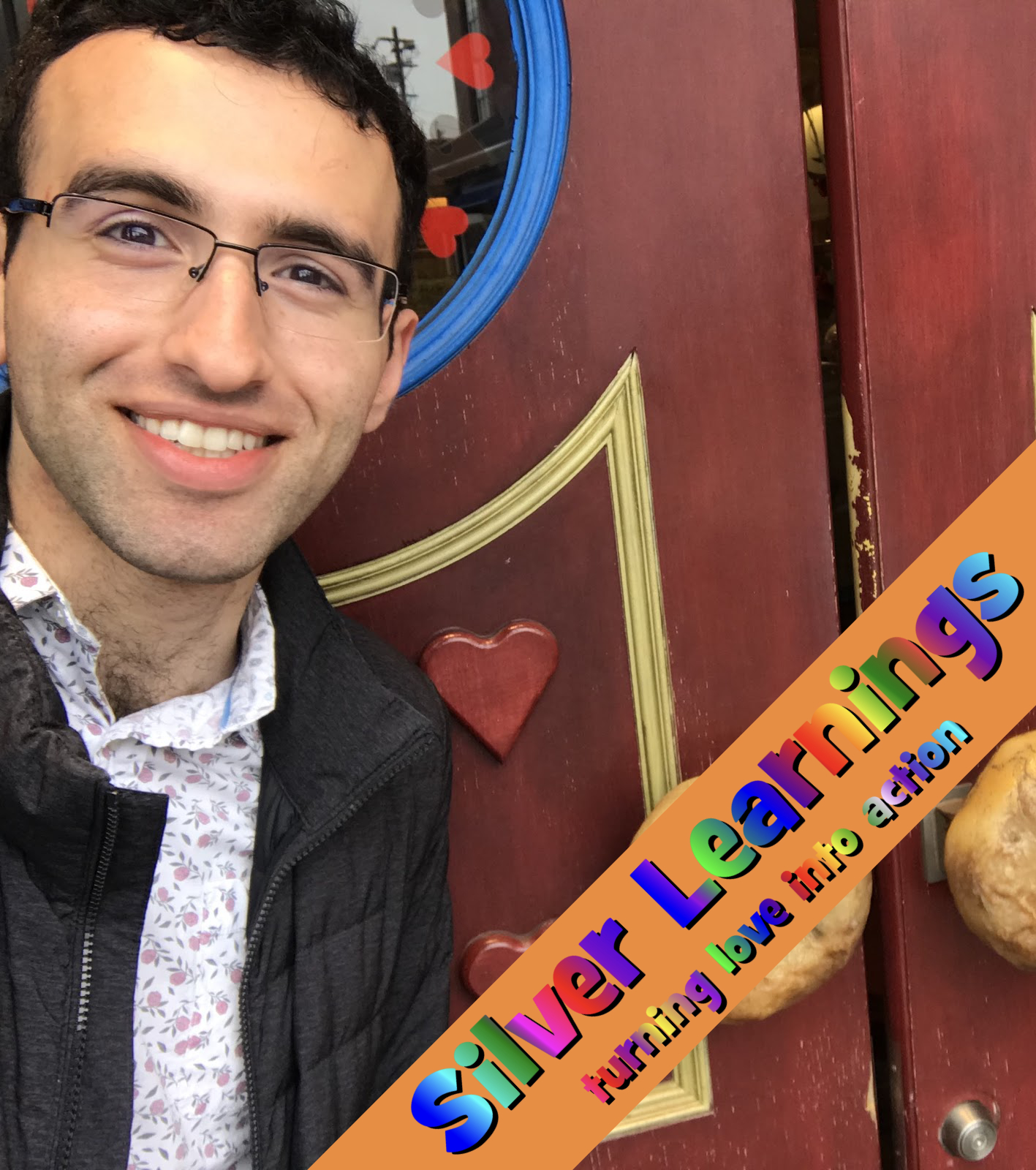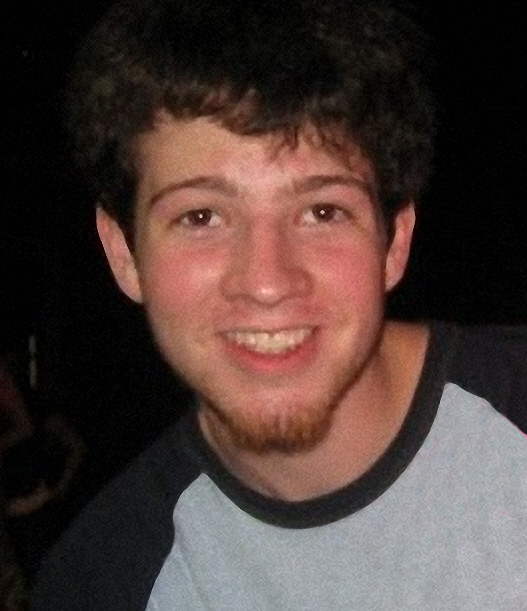These past 15 months, no matter how “hard” or “easy” any of us had it, we’ve learned a lot. Good stuff even. Our learning, you could say, has been one of the pandemic’s silver linings. To acknowledge some of those Silver Learnings, we’ve invited friends from different walks of life to share what they’ve learned from the pandemic. Our guess is you’ll hear some voices that sound like your own, and some that offer a window into a world you’ve not known but from which we can all now learn.

Evangelo Maniotis is a linguist and interpreter who was working in Japan as an assistant English teacher when the pandemic began. He’s a polyglot who has worked as an ESL teacher and interpreter both online and in various countries. He has also tutored other languages.
* * *
My family is a closely-knit collection of Italians and Greeks, so me having most of my work in other countries means breaking a whole lot of hearts. My family certainly made no small noise when I was all by myself during a global crisis. It is, of course, thanks to that noise that I am currently home in New York and safe in their arms.
I worked at two middle schools as an assistant teacher in Gifu, Japan. Gifu is a fairly rural area. It’s surrounded by mountains, essentially a cereal bowl, and pooled inside is all that humidity we know and love. There have also been the occasional typhoons and city floods that I’ve walked home in, but I like to see that as more of an adventure. Japan is full of convenience stores with no small shortage of raincoats, so it was more like getting from one convenience store to the next until I made it home.
While in Gifu, I made some fantastic friends both expatriate and native Japanese. With them, my off-hours could be full of Japan’s amazing karaoke culture, a public bathhouse that felt like a water theme park to me, as well as breathtaking (literally and emotionally) hikes up Gifu’s famous mountain that were always followed by my favorite part: a feast. By and large, though, I was working Monday-Friday, sometimes to Saturday. I’d generally arrive at my second school an hour early to greet the students at the gate, and a couple of times I’d leave work much, much later than scheduled. The sense of achievement society gives for working past your limits can be intoxicating, and perhaps out of loneliness I felt an obscene sense of pride arriving at home in the evening in a suit and tie. I never considered myself a skilled professional, so when Japanese coworkers began leaning on me over the other English teachers for my Japanese ability, I happily accepted the extra responsibility, which meant a few unpaid requests to stay for night meetings.
The loneliness that I was shrugging off through aggressive work found moments of peace whenever I could add smiles to my overworked students’ days. My favorite moment was walking around the schools with reindeer antlers all day on Christmas and the following day to the joy of all my students at both schools.
However, I think that most impactful was the personal lesson I was permitted to give all my students at my secondary school. Japan’s school year is April to March, and it was the last week of February 2020 when I began giving my final lessons. It centered around New York City’s graffiti culture, and ended with all the students taking a sheet of paper and creating their own graffiti tag. As Japan’s education system, albeit now under reformation, is famously rigid, a key point of my lesson was impressing the importance of having a unique identity to include in their tags. Many students finished by the end of their respective class with me. I titled each of them an Honorary New Yorker for finding their identity. For the others, I encouraged them to show me their completed tags the following Monday, which would also be when my final lesson was scheduled. The elation on their faces, and the packets of Thank You cards and art I received that week nearly brought me to tears. Excited to see the remaining art, as well as teach my final group of kids, I made my way home that Thursday evening. It was within the span of reading my cards at a Starbucks in the city center, and arriving at my apartment further south amidst rice paddies, that I was made aware of the Prime Minister’s sudden announcement: due to the coronavirus making its way into Japan, all schools were to be closed starting Monday. As my Fridays were scheduled at my main school, I never saw more than a couple passing students from the second school again. Those that were excited to show me their art, and those that had yet to have the lesson with me, never got to do either.
As an employee, my work proceeded apace: grading, making bilingual tests, cleaning the schools or fixing windows and A/C units – whatever I could do to maintain the semblance of utility. I was, ultimately, a third-party worker, and that meant having to prove to the Board of Education that my third party was still a vital part of the system.
Even during a pandemic.
Graduation ceremonies still took place, but I was only scheduled to attend that of my main school. The students expressed frustration in their graduation speeches. In Japan, the step from middle school to high school is one of the biggest, with effort to apply akin to how we might apply to colleges. This was a big day for them, and it was now an uncomfortable, watered down event. Fortunately, I was able to see these students one last time before everything ended. Students I joked with at lunch, bickered with the teachers in front of in theatrical English performances, or sang Backstreet Boys in the hallways with. Students I spent a year bonding with, now all caught off guard that it was time to say goodbye. There were tears.
My family, meanwhile, was trying to get me the earliest flight home possible. All my coworkers from out of the country were increasingly frantic to get home. Some of us began to work from our apartments. The rapport with our company was strained as professional needs and personal needs began to conflict like never before. There was, admittedly, a little skepticism regarding the situation, as my city had not yet been affected by the pandemic. What was worse, though, was knowing the shutdown was only going to be until the upcoming April, during which time we teachers would have been in the school together nonstop working. So, if any of us had contracted Covid, then the brief shutdown would have meant little the moment the first and second years returned. The situation felt messy, and many of the protective options felt more concerned about national pride than actually protecting anyone. Japan was to host the Olympics, and, at least for us immigrants, it felt like their emergency situation was in the interest of protecting that event.
There was an interesting development in my secondary school, though. Being the more elite of the two, with teachers always run ragged and my desk ever stacked to the ceiling in papers, I noticed a surprising shift in how… relaxed some of them had become. They had their moments of excessive work and running in and out of the office, but as the weeks went by, they slowly had no more demanding things to do. At noon, we were no longer putting meals together with in-school lunches. Instead, I was being invited out to restaurants with a bunch of teachers. The art teacher in particular began joining me for park walks at lunch to eat together. The level of relaxation was so rare. I know one of my English teaching coworkers was more than happy to get out of the office to see his wife and kids.
At home, I was working with my family to get a flight out of Japan. Every flight booked was impossible to confirm. Phone calls were vague, either intentionally or due to complete confusion on the employees’ part. There would be radio silence, if not outright insistence, from airlines on the valid status of a flight. Then within weeks we’d find out that my flight “doesn’t exist.” Businesses were in disorder, and flights around the country were slowly closing. My coworkers had the right idea: it was leave now or be trapped in the country during a pandemic.
For my part, I could not shake the need for closure and reward for all the effort I had put into both my job as well as my personal growth. I wanted to see if I could get my lesson to the last students at their house. I was insistent on seeing my contract through to the end despite there being no more students. I wanted a chance to say goodbyes, to see the culmination of a year’s work. And so I stayed for a few more weeks.
My neighbor would come over my apartment and have a cleaning spree with me, as I was in a rush to move out of my apartment but too busy with work to devote time to it. I sacrificed a lot of souvenirs I had bought, too. Another friend helped me ensure I could safely end my gym membership, and yet one more friend helped me find a hotel, ship out a package, and work with my bank.
More flights that my family booked for me got canceled. And the final flight was in the last week of March. My last day of work, and my last day to get out of my apartment, I ran to my secondary school per their request for a goodbye ceremony of all the teachers moving schools or, in my case, leaving the country entirely. I wanted to say so many things, but didn’t want to take up time truly meant for those with years under their belt. I made sure all my coworkers I bonded with had chocolates and letters from me. Having to catch a bus back for over an hour to my apartment to finish cleaning, I was unable to have closure in person with one of my coworkers I had bonded with.
Bouquet of flowers and certificate in hand, all I could think was how much more I wanted to accomplish.
The last flight we finally booked left us all in anticipation the night of my departure. The connecting flight to another prefecture in Japan went according to plan. Then, there was the international flight. While I was sitting on a bench, there was an announcement in Japanese and English. This would be the final flight before the airport closed down. A notice that first scared me, but it had no bearing on me leaving Japan, other than having a few extra souvenirs in tow. Not everything, I suppose, had to be an obstacle.
The path leading to the flight was such a whirlwind, and then just like that, I was back at home, hiding in a separate floor from the family for weeks, and wanting for little. I kept thinking about how I found and immediately lost a sense of accomplishment and self-satisfaction, especially during a time in the world where many shallow indulgences have gone stale. Yet seeing how easily my sense of control and accomplishment could be disrupted, I realized how much more I needed to grow. Relax, but not become idle. Work, but not at the cost of my own health. I hope, in the time that has passed since, that I have something to show for that growth.
Evangelo Maniotis









1 comment
Join the conversationAnt - June 12, 2021
DAMN… I read this twice over, you’re a great writer & an even better story-teller :D. Good job Evangelo